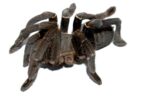Buying a tarantula can be tricky if you’re new to arachnid pets. These fascinating creatures come in many species, each with unique needs and behaviors. This guide will walk you through HOW TO BUY A TARANTULA, covering key factors to consider before bringing one home.
Ready to find your perfect eight-legged friend?
Choosing the Right Species
Picking the right tarantula species is crucial for a happy pet ownership. You’ll want to match your experience level with the spider’s care needs and temperament.
Consider lifespan and size
Tarantula lifespan varies greatly between species and genders. Females of some tarantula species can live up to 20 years with proper care, while males typically have shorter lifespans of around 5 years.
Size is another crucial factor to consider. Adult tarantulas range from small to large, with some species reaching leg spans of several inches. Smaller tarantulas do better in compact enclosures, which helps manage space in any living environment.
Size matters in the tarantula world – choose wisely for your space and experience level.
Tarantulas, despite their size, do not need large spaces. They spend most of their time motionless in one chosen hiding spot. An excessively tall terrarium, for example, for a large terrestrial tarantula, can result in a fall and potential death.
When purchasing spiderlings, look for ones at least 1 inch in size to ensure they’re past their most vulnerable stage. If you are a beginner, it’s worth considering this size to reduce the risk of loss and ensure a more manageable start.
Understand behavior and habitat needs
After considering lifespan and size, you’ll need to understand your tarantula’s behavior and habitat needs. Different species have unique requirements based on their natural environments.
Terrestrial tarantulas prefer ground-level setups, while arboreal species need vertical space for climbing. Fossorial tarantulas enjoy burrowing, so they require deeper substrate.
Your tarantula’s enclosure should mimic its natural habitat. Provide hiding spots, appropriate humidity levels, and the right temperature range. Some species need higher humidity, while others thrive in drier conditions, making them more low-maintenance.
Research your chosen species thoroughly to ensure you can meet its specific needs. This knowledge will help you create a comfortable home for your eight-legged friend and promote its overall well-being.
Where to Buy Tarantulas
Reputable online breeders offer a wide selection of tarantulas for sale. Local pet stores with knowledgeable staff can also provide healthy spiders and care advice.
Online breeders with ethical practices
Ethical online tarantula breeders prioritize the well-being of their spiders and customer satisfaction. These sellers follow strict guidelines to ensure healthy, well-cared-for arachnids reach their new homes safely.
- Guarantee of live arrival: Reputable online breeders offer a Live On Arrival guarantee. This ensures customers receive healthy tarantulas or get a replacement or refund.
- Safe shipping practices: Ethical breeders use proper packaging methods to protect tarantulas during transit. They consider factors like temperature control and cushioning to minimize stress.
- Transparent information: Trustworthy sellers provide detailed descriptions of their tarantulas, including species, age, and care requirements. This helps buyers make informed decisions.
- Customer support: Top breeders offer ongoing assistance to new tarantula owners. They provide guidance on care, feeding, and habitat setup.
- Price matching: Some ethical breeders match competitors’ prices to ensure fair deals for customers. This practice shows commitment to both quality and value.
- Sustainable breeding: Responsible breeders focus on captive-bred tarantulas rather than wild-caught specimens. This approach supports conservation efforts and produces healthier pets.
- Proper care before shipping: Ethical breeders ensure tarantulas are well-fed and hydrated before shipping. They may offer feeder insects like dubia roaches or wax worms with the purchase.
Reputable pet stores with informed staff
Reputable pet stores offer a reliable source for purchasing tarantulas. These establishments provide valuable guidance and ensure proper care for your new arachnid companion.
- Knowledgeable staff: Reputable stores employ experts who can answer questions about tarantula species, care, and behavior.
- Clean facilities: Well-maintained stores demonstrate commitment to animal welfare and health.
- Proper housing: Tarantulas should be kept in appropriate enclosures with correct substrate and humidity levels.
- Variety of species: A good store offers a range of tarantula species to suit different experience levels.
- Health checks: Staff regularly monitor tarantulas for signs of illness or stress.
- Ethical sourcing: Reputable stores obtain tarantulas from responsible breeders or captive-bred sources.
- Care sheets: Stores provide detailed information on tarantula care, diet, and habitat requirements.
- Quality supplies: Reputable stores stock essential items for tarantula care, including enclosures and food.
- Observation opportunities: In-store visits allow you to see tarantulas’ behavior and health firsthand.
- After-sale support: Good stores offer ongoing advice and assistance after purchase.
Ensuring tarantula health is crucial when making a purchase. Let’s explore the signs of a healthy tarantula and red flags to avoid in sellers.
Ensuring Tarantula Health
Healthy tarantulas show clear signs of vitality. Look for active movement, a plump abdomen, and intact limbs when selecting your new pet.
Signs of a healthy tarantula
Identifying a healthy tarantula is crucial for new and experienced owners alike. Here are key indicators to look for when assessing a tarantula’s well-being:
- Balanced weight: A healthy tarantula is not always one with a plump abdomen; you should also check if the abdomen is not unnaturally small or wrinkled.
- Proper hydration: Well-hydrated tarantulas display a plump abdomen and active behavior.
- Clear exoskeleton: Look for a clean, spot-free exterior without blemishes or discoloration.
- Clean fangs: Healthy tarantulas have clear, unobstructed fangs free from debris or buildup.
- Active movement: Observe the tarantula’s locomotion for smooth, coordinated movements.
- Intact limbs: All legs should be present and functioning without signs of injury or deformity.
- Appetite: Normal feeding habits and interest in prey items suggest good health.
- Proper posture: A healthy tarantula maintains a natural stance without unusual positioning.
Red flags to avoid in sellers
Buying a tarantula requires careful consideration of the seller. Here are key red flags to watch out for when selecting a tarantula vendor:
- Unsanitary conditions: Dirty enclosures or unhygienic handling practices can lead to sick tarantulas.
- Misidentified species: Sellers who can’t accurately identify their tarantulas may lack essential knowledge.
- Wild-caught specimens: Avoid vendors selling wild-caught tarantulas, as these often have health issues and unknown histories.
- Lack of proper care information: Reputable sellers provide detailed care sheets and guidance for each species.
- Refusal to answer questions: Good sellers welcome inquiries about their tarantulas’ origins and care.
- Unrealistic prices: Extremely low or high prices may signal dishonest practices or unhealthy specimens.
- Poor communication: Sellers who are slow to respond or provide vague answers may be untrustworthy.
- No return policy: Legitimate vendors offer reasonable return policies for DOA (dead on arrival) tarantulas.
- Lack of proper documentation: Ethical sellers provide records of breeding history and any necessary permits.
Which tarantula is best for a beginner?
Choosing the right tarantula for a beginner is highly individual. Some species are calm but require meticulous care and specific conditions, while others are more tolerant of beginner mistakes but may be challenging to handle due to their temperament and speed.
It’s often best to start with a small, calm tarantula that you are not intimidated by in terms of size and gradually acclimate to its growth. Researching the species you are interested in is crucial, as keeping a tarantula the size of a pinhead can be problematic, particularly in terms of feeding. Additionally, a very calm tarantula that is rarely seen might seem too dull for some, potentially discouraging them from continuing with the hobby. (I personally started with the Stromatopelma genus as my first tarantula, and I’m doing well.)
Species that are considered a good balance for beginners include those from the Psalmopoeus genus or Lasiodora parahybana. It’s also valuable to watch YouTube channels to learn healthy handling techniques and tarantula body language, which will help you develop the skills needed to care for more intriguing species over time.
FAQs
1. Is owning a tarantula hard?
Owning a tarantula is very simple because it involves spraying the walls of its tank with water or replacing the water dish, feeding it once a week, and in the case of an adult, feeding it abundantly once a month. It is the perfect exotic pet for anyone who has very little time to care for animals.
2. What to know before buying a tarantula?
Before purchasing a tarantula, we should have a general basic knowledge available on the internet as well as detailed information about the species we intend to own. It is worth having basic tools ready before the purchase, such as tweezers, containers, substrate, and appropriately sized feeder insects.
3. Are tarantulas good pets for beginners?
These exotic animals have long lifespans and are ideal for beginner enthusiasts due to their low maintenance, resilience, and low upkeep costs, which mainly involve feeding the insects we use to feed our tarantulas.
4. Can you buy a tarantula?
Yes, you can buy a tarantula, but in some cases, such as with the Poecilotheria species, you will need to have documentation proving its origin.
5. Where to buy a tarantula?
You can buy a tarantula in local pet stores, although most of the trade and species variety is found online. You should look for reputable breeders on forums and Facebook groups.







